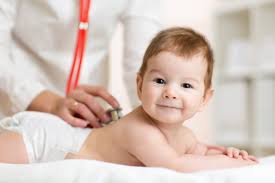 Department of Paediatrics was established since the beginning of Hospital. The services available in the department are outpatient, inpatient, neonatal, intensive care unit and paediatric intensive care unit. Up to 2000 children are born every year in the hospital. 20 percent of all the new-borns are at high risk and need level-II or level-III care during their stay in the hospital. The faculty is considered to be of highest calibre in the district and periphery. The body size differences are paralleled by maturation changes. The smaller body of an infant or neonate is substantially different physiologically from that of an adult. Congenital defects, genetic variance, and developmental issues are of greater concern to paediatricians than they often are to adult physicians. A common adage is that children are not simply "little adults". The clinician must take into account the immature physiology of the infant or child when considering symptoms, prescribing medications, and diagnosing illnesses. A major difference between the practice of paediatric and adult medicine is that children, in most jurisdictions and with certain exceptions, cannot make decisions for themselves. The issues of guardianship, privacy, legal responsibility and informed consent must always be considered in every paediatric procedure. Paediatricians often have to treat the parents and sometimes, the family, rather than just the child. Adolescents are in their own legal class, having rights to their own health care decisions in certain circumstances. The concept of legal consent combined with the non-legal consent (assent) of the child when considering treatment options, especially in the face of conditions with poor prognosis or complicated and painful procedures/surgeries, means the paediatrician must take into account the desires of many people, in addition to those of the patient.
Department of Paediatrics was established since the beginning of Hospital. The services available in the department are outpatient, inpatient, neonatal, intensive care unit and paediatric intensive care unit. Up to 2000 children are born every year in the hospital. 20 percent of all the new-borns are at high risk and need level-II or level-III care during their stay in the hospital. The faculty is considered to be of highest calibre in the district and periphery. The body size differences are paralleled by maturation changes. The smaller body of an infant or neonate is substantially different physiologically from that of an adult. Congenital defects, genetic variance, and developmental issues are of greater concern to paediatricians than they often are to adult physicians. A common adage is that children are not simply "little adults". The clinician must take into account the immature physiology of the infant or child when considering symptoms, prescribing medications, and diagnosing illnesses. A major difference between the practice of paediatric and adult medicine is that children, in most jurisdictions and with certain exceptions, cannot make decisions for themselves. The issues of guardianship, privacy, legal responsibility and informed consent must always be considered in every paediatric procedure. Paediatricians often have to treat the parents and sometimes, the family, rather than just the child. Adolescents are in their own legal class, having rights to their own health care decisions in certain circumstances. The concept of legal consent combined with the non-legal consent (assent) of the child when considering treatment options, especially in the face of conditions with poor prognosis or complicated and painful procedures/surgeries, means the paediatrician must take into account the desires of many people, in addition to those of the patient.
Aims and Objectives
Enlisted below are the prime objectives of the department:
- To provide outdoor and indoor facilities for poor and needy patients to free of cost throughout year
- Enhance comprehensive neonatal care on 24-hour basis in the form new-born check-up, neonatal resuscitation, Neonatal admission, phototherapy for jaundiced babies
- Provision 24hr emergency care to all paediatrics patient
- To educate mothers about importance of breast feeding & cpeanlinen preparation of food, prevention of diarrhoea and communicable disease (like measly, chicken pox, T.B etc.)
- Educate the parents to prevent malnutrition by breast feeding & proper weaning
- Treat the malnourished children in stabilization center
- To provide facilities of vaccination in hospital, and motivate the health professionals, parents regarding importance of vaccination, because “Prevention is better than care”
- To conduct neonatal resuscitation workshops for nurses, doctors of peads and gynae
Standard Operating Procedures (SOPs)
Department have following standard operating procedures (SOPs):
- Ensures smooth functioning of the all units of department (OPD/Vaccination Clinic/Nursery/Paediatric Ward /Paediatric ICU)
- Responsible for assessment, diagnosis and management of pediatric patients in OPD, IPD and emergency
- Overall in charge of Paediatric OPD and conducts OPD regularly on notified days and time
- Consultant will take one planned round of the wards/nursery daily along with doctors and staff nurse to review/follow-up the old cases and examines in detail the newly admitted. Round is repeated if required
- Ensure that all newborns are being received and assessed promptly after delivery in Operation Theatre and Labor room
- Ensures availability of medicines / functioning of equipment to handle emergencies at all times in the Unit. Attends the patients with medical problems admitted in other wards as and when required
- Plans and performs Procedures on specified days & time as per hospital policy
- Performs emergency procedures on patients admitted through A & E Department as & when required
Future Plans
Department have following future plan:
- MSDS training Accreditation
- Central Air Conditioning and Heating System
- Central Oxygen supply
- Increase number of beds
- Establishment of paediatric emergency (Full resuscitation faculty equipped with tools)
- Increase Human Resource (Doctors and Staff)
